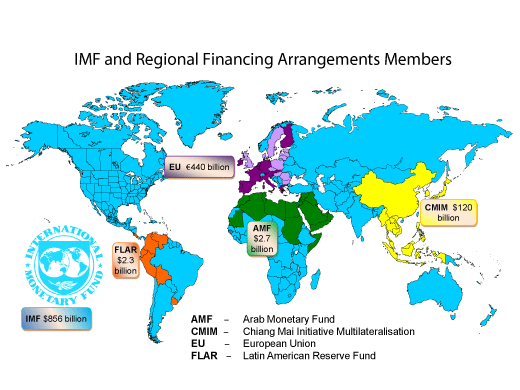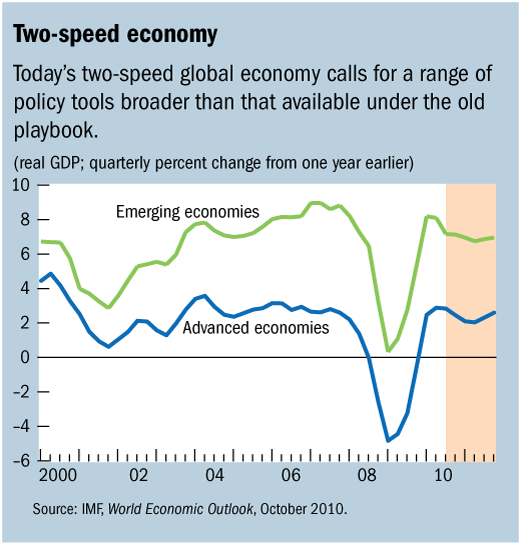
Typical street scene in Santa Ana, El Salvador. (Photo: iStock)
IMF Survey: IMF, Regional Financial Safety Nets to Create Stronger Links
October 26, 2010
- First high-level meeting of regional financing bodies, IMF
- Benefits seen from greater coordination on crisis financing
- Ultimate objective is to strengthen global financial safety net
The global financial safety net—the global network of crisis financing instruments—stands to benefit from increased cooperation between international and regional financing arrangements, according to high-level policymakers and experts meeting in Washington.

Factory in Bucharest, Romania: EU-IMF collaboration showed global institutions, regional financing working together (photo: Daniel Mihailescu/Newscom)
HIGH-LEVEL SEMINAR
The IMF-hosted seminar on “Regional Financial Safety Nets” was a first. The October 8 meeting of member representatives from regional financing arrangements from Asia, Europe, Latin America, and the Middle East aimed to start a dialogue on greater synergies between such regional arrangements and the IMF (see map).
The ultimate goal is to strengthen surveillance and the effectiveness of cofinancing mechanisms for countries vulnerable to crises, responding to calls by the Group of Twenty industrialized and emerging market economies and the IMF’s governing body, the International Monetary and Financial Committee.

New approach
Participants from Asia and Latin America felt that first best policy solutions from the “old playbook”—such as fiscal discipline and monetary policy focused on controlling inflation—are no longer adequate.
Today’s two-speed global economy—characterized by volatile capital flows and financial interconnections between economies—calls for a broader range of policy tools, they said (see chart). These include macroprudential regulation, as well as stronger collaboration between national, regional, and global safety nets.

IMF Deputy Managing Director Naoyuki Shinohara echoed this point in his opening remarks, highlighting two key lessons from the recent financial crisis.
• The global nature of the crisis called for coordinated policy responses—specifically, measures taken in unison by the global community to overcome systemwide shocks.
• Successful collaboration between the European Union and IMF on financing and policy advice in response to the crisis—in Greece in particular but also in Hungary, Latvia, and Romania—demonstrated the value of international institutions and regional financing arrangements working together.
Participants agreed that regional arrangements should use this crisis to strengthen their regional safety nets as well as to work out a set of procedures, during peacetime, to work with the IMF.
Comparative advantage
Participants agreed that there are important complementarities between regional financing arrangements and the IMF given their relative strengths and roles. Speakers said regional arrangements can be most effective in dealing with localized shocks, while the IMF is best placed to provide support during systemic crises. To prevent future crises, the IMF and the regional entities should interact effectively, particularly on how to maintain financial stability in member countries, participants believed.
Specifically, regional financing arrangements tend to have more in-depth understanding of regional issues and member-specific information. Relatively strong ownership and reduced stigma among member countries also offer regional arrangements an advantage in facilitating policy coordination, as is the case with the stability and growth pact in Europe.
Participants broadly agreed that the IMF’s near universal membership allows it to mobilize large amounts of financial resources and spread risks. The IMF also has the advantage of a global cross-country perspective in assessing economic policies and conditions in member countries, as well as technical expertise in crisis management.
Clear view
Participants shared the view that it is better to establish frameworks for cooperation between regional financing arrangements and the IMF before, rather than under, the pressure of a crisis.
Speakers said there is no one-size-fits-all model of how regional safety nets can interact either with each other or with a global safety net, but if there is a clear view of an objective in bad times, rules need to be formulated in good times.
In this regard, participants suggested that, to further strengthen the global financial safety net, working relationships between international and regional financing arrangements should be tailored to the specific mandate and membership characteristics of each regional entity.
The development of operational procedures by ASEAN+3 countries for deploying the Chiang Mai Initiative Multilateralization, including cooperation with third parties, was highlighted.
Speakers said working with the IMF is one of the most important elements, as a drawing of 80 percent of Chiang Mai funds is conditional on the existence of an IMF-supported program.
Crisis prevention role
Looking forward, ASEAN+3 participants also saw scope for exploring the idea of a Chiang Mai crisis prevention role that complements the IMF’s Flexible Credit Line or Precautionary Credit Line and for developing a dialogue mechanism with the IMF.
Successful joint programs in Europe had been characterized by well developed collaboration between European institutions and the IMF in surveillance and in designing program conditions, according to EU participants. They added that the joint EU-IMF formulation of policy conditions had helped to keep moral hazard in check.
Benefits of technical cooperation with the IMF—including joint training programs, seminars, and workshops—were emphasized by participants from the Arab Monetary Fund.
Plans for dialogue
Participants agreed it would be important to maintain dialogue, with multilateral and bilateral meetings to be organized during the period leading up to the 2011 Annual Meetings of the IMF and World Bank.
“The international community stands to benefit from leveraging each other’s strengths and we should work towards greater interaction in the future to foster mutual collaboration in surveillance, technical cooperation, and cofinancing,” noted the IMF’s Managing Director Dominique Strauss-Kahn in his closing remarks. “This seminar sets a strong foundation for working together in the next months,” he concluded.


